The 9 Best HappyFox Alternatives on the Market in 2023


Providing exceptional support comes down to two things: great people and the right tools. If you’re missing either of those, the job becomes exponentially more difficult. Finding the right tool is arguably the easier of the two, but it still comes with its challenges.
Just as each support team is unique, so are their wants and needs when it comes to the tools they use to offer support to customers. That idea has spawned support software companies that take an a la carte approach to their offerings. One of the most prominent examples of this is HappyFox.
Instead of offering a prepackaged platform, you’re able to select the different tools you want, paying a monthly fee to access each. Though it means you can tailor fit the solution to your needs, it does make pricing a bit more confusing and less predictable, which can be problematic when trying to get approval or if you need to add a new team member.
If you’re a current HappyFox user looking to switch or you’re simply gathering options in your support software search, the nine HappyFox alternatives below are a great starting point.
The 9 best HappyFox alternatives
Though there is a decent amount of crossover feature-wise, each of nine alternatives to HappyFox below do have their own distinguishing factors, making them better suited for certain use cases:
Help Scout
LiveAgent
Zoho Desk
Zendesk
Freshdesk
Front
Salesforce Service Cloud
TeamSupport
Kustomer
1. Help Scout
Best HappyFox alternative for growing teams.
Help Scout is a dedicated customer support platform built for growing teams to deliver top-notch customer service. When you sign up, you get access to an entire suite of tools, all built to help you create the best customer experience possible.
Our shared inbox includes features like private notes and @mentions to improve team collaboration and collision detection to prevent duplicate work by showing when an agent is actively working on a specific conversation.
You’re also able to automate routine tasks like conversation sorting with workflows and add additional context with customer profiles.
If you want to empower customers to help themselves, our knowledge base builder, Docs, is right up your alley. The intuitive editor makes creating self-service content quick and easy. Built-in search functionality and organization features help customers find the answers they need quickly. Lastly, Docs-specific reports show which content is doing best and areas where you have room for improvement.
Beacon offers live chat capabilities and proactive support options through an embeddable widget. Customers can search your Docs site articles or submit a question to your support team right from the widget, helping them get answers when and where they need them most.
Help Scout also comes loaded with pre-built performance dashboards through our reports. You can also create custom reports to zero in on the metrics that matter most to you and your team. Last, but certainly not least, you get access to Help Scout’s world-class support team, which is available by email 24/6 to answer any questions you may have.
Price: Starting at $20/user per month.
2. LiveAgent
Best HappyFox alternative for chat-heavy teams.
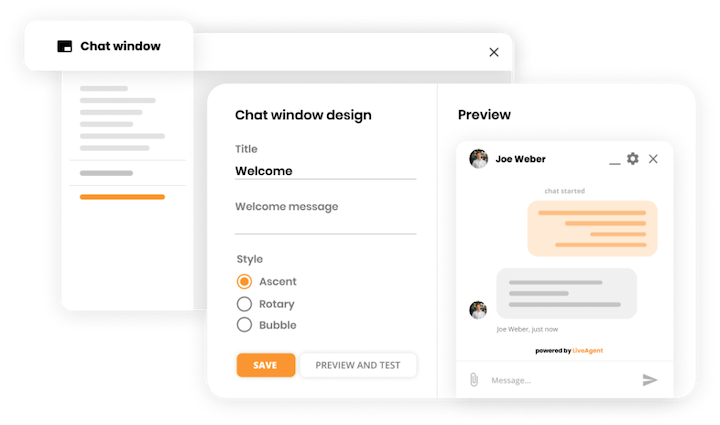
When LiveAgent originally launched, they were primarily focused on helping teams provide great live chat support. As they’ve grown, they’ve added more tools to their toolbox, like a shared inbox, social support (there’s an additional cost for each channel), and even video calling (though that’s only offered on their higher-cost plans).
Though they do offer good coverage, the cost increases pretty steeply as you add different services, which could make LiveAgent a bit pricey for some. If you don’t need access to all the channels they offer, there are other options on the list that are more competitively priced.
Price: Starting at $15/agent per month.
3. Zoho Desk
Best HappyFox alternative for teams using Zoho.
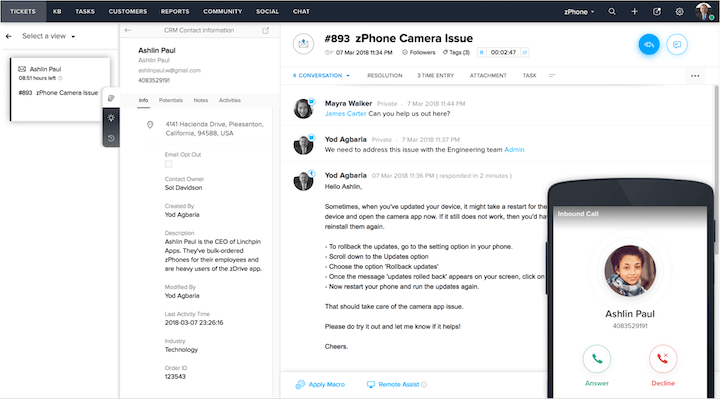
Zoho first made a name for themselves with their CRM product. As the company grew, they expanded out into other offerings, one of which is a help desk solution called Zoho Desk. When you sign up, you get access to support tools like a shared inbox, live chat, a knowledge base builder, and reporting to track team progress.
They also offer productivity features like saved replies and basic automations to reduce manual work for your team. If you’re a Zoho CRM user, the two integrate seamlessly, giving you a complete picture of your communication with a specific customer, which can save time and hassle for everyone involved.
Price: Free plan available. Paid plans starting at $14/agent per month.
4. Zendesk
Best HappyFox alternative for large teams.

If you know one help desk software by name, chances are it’s Zendesk. They bucket their offering into two different plan types: foundational and suite. The foundational plans are less expensive, but they are primarily limited to email support, though they do offer some basic reporting and productivity features.
The suite plans offer omnichannel coverage, starting at $49/agent per month, which is a bit pricey. Their suite plans include a shared inbox, a live chat tool, a knowledge base builder, reporting, and productivity tools like automations, integrations, and AI-powered automated responses.
Though the list of features is long, it’s also more than most teams need. Zendesk also tends to take a lot of time to set up, meaning you could be paying for two tools for months while you get everything going and staff trained. If you don’t have a giant budget or the need for all their advanced features, it may be better to look elsewhere.
Price: Starting at $19/agent per month.
5. Freshdesk
Best HappyFox alternative for phone-heavy teams.

Freshdesk is a customer support suite including a shared inbox, live chat software, a knowledge base builder, and even some AI-powered automated responses (though that functionality is limited to their highest cost plan).
In all honesty, Freshdesk is a very similar offering to Zendesk, even down to the fact that they split plans into two groups: support desk and omnichannel. However, they do offer more advanced phone functionality, with included minutes on all their omnichannel plans (starting at $29/agent per month). So, if your team is heavy on phone support, they could be a good option.
Price: Free plan available. Paid plans starting at $15/agent per month.
6. Front
Best HappyFox alternative for teams wanting to use personal email addresses.

It’s common for support teams to have a group email address ([email protected]) but in some cases, that may not be ideal. If that’s the case for you, Front may be a good option. It’s a shared inbox tool that allows users to respond from a personal email address.
Along with that capability, they have some collaboration tools like internal notes and ticket assignment capabilities. There are also some productivity tools like basic automations, though that functionality is limited to their higher-cost plans.
Price: Starting at $19/person per month.
7. Salesforce Service Cloud
Best HappyFox alternative for teams using Salesforce.
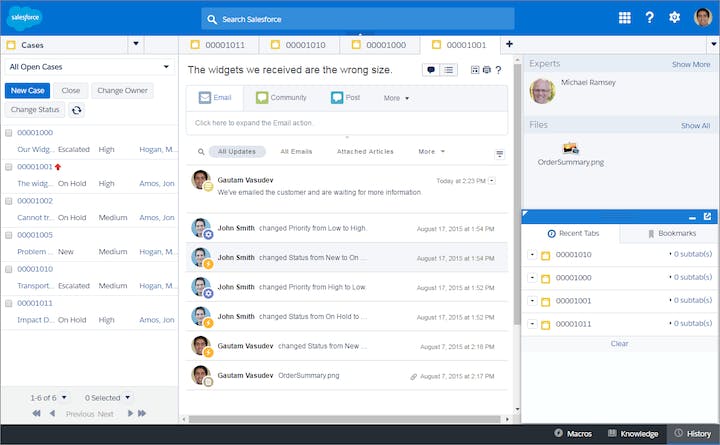
Similar to some others on this list, Salesforce may not immediately come to mind when thinking about support tools, but they’ve actually been making customer support software for quite some time. The most recent iteration is Service Cloud.
Service Cloud includes a shared inbox, a knowledge base builder, and a live chat tool. You also get access to some common features like internal notes, automations, tagging capabilities, and reports to understand team performance. If you use another Salesforce product, you can integrate the two to get even more detail about the people you’re interacting with.
Price: Starting at $25/user per month.
8. TeamSupport
Best HappyFox alternative for B2B support teams.
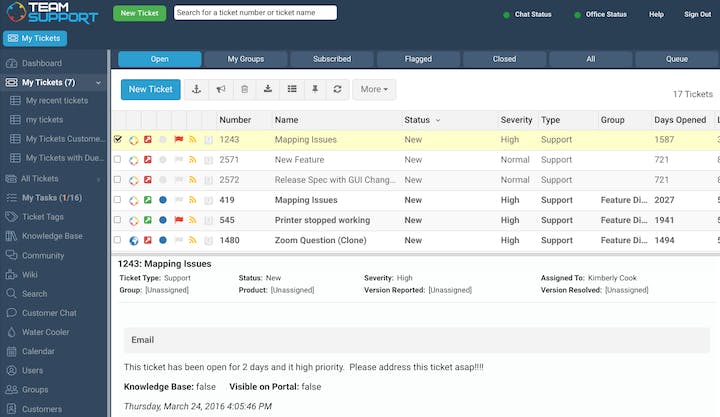
TeamSupport is a customer service platform built specifically for teams working in the B2B space. Many of their tools are similar to others on the list — they offer a shared inbox, a knowledge base builder, and live chat software (though chat is only offered on their higher cost plans).
However, they also have some more advanced customer management features like in-depth customer profiles, the ability to have different SLAs for different customers, and a customer health dashboard to help keep your team informed and able to anticipate customer needs.
Price: Starting at $49/agent per month.
9. Kustomer
Best HappyFox alternative for teams wanting CRM capabilities.
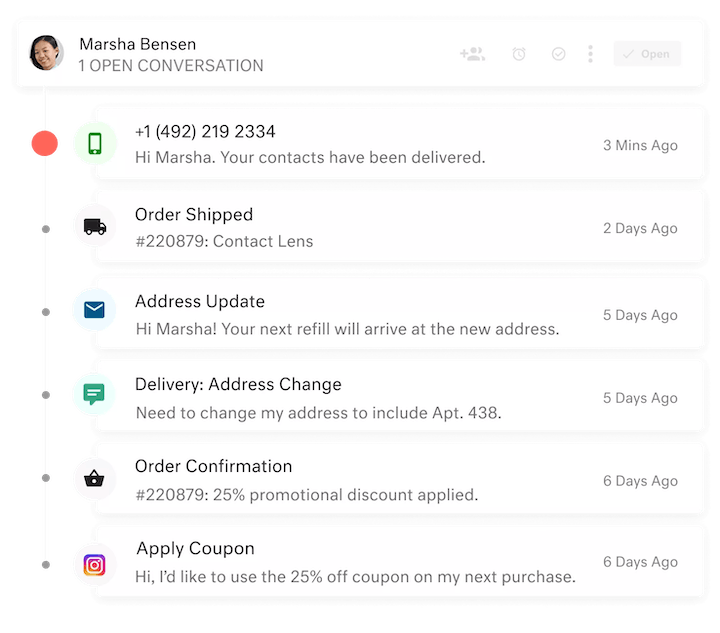
Kustomer is kind of a cross between a customer support tool and a CRM. You get access to things like a shared inbox, a knowledge base builder, and live chat software. They also have an AI product called Kustomer IQ which is meant to help with ticket deflection and is capable of handling very basic customer service requests.
On the CRM side of things, you’re able to build out customer profiles so agents have a more complete picture of people they’re communicating with. You can add custom objects to profiles to include relevant data, as well as limit access to different parts of the platform to make sure all your customer data is secure.
Price: Starting at $89/user per month.
Making the right choice
Having access to the right tools is paramount for any support team’s success. No one wants to overpay for features they don’t need, but there’s a balance to strike.
Teams grow, and their needs change. Make sure you’re not buying based on just what’s happening at the moment. Instead, buy with your current and future needs in mind.




